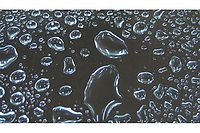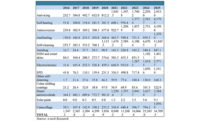Microbes in Compost: The Little Heroes Battle Climate Change
A hungry community of microbes captures and digests pollution.
Microbes in specially designed compost-filled spheres are eating away at the world’s carbon emissions problem. Bio-Reaction Industries (BRI), a company that uses microbes from ordinary compost in its bio-oxidation systems to eliminate toxic emissions from factories, has installed 10 new systems for customers in the wood products industry in the last year alone.
More than 25 large-scale Bio-Reaction systems are in place throughout the United States, with customers such as Weyerhaeuser, Toyota and Sherwin-Williams; the company has also expanded into global markets, with representative partnerships in China, Southeast Asia and Europe. The latest installations in the wood products industry are complete with the following customers: Weyerhaeuser, Collins Forest Products, Freres Lumber, Humboldt Flakeboard, J.M. Huber, Louisiana-Pacific, Norbord, Roseburg Forest Products, and Temple Inland.
“With a boost from our patented technology, the microbes have a chance to be heroes in the climate change arena. They eat bad pollutants, reduce carbon emissions and, save companies hundreds of thousands – sometimes millions – of dollars in energy costs,” said Karl Mundorff, President and CEO, Bio-Reaction Industries. “Reaching this milestone of adoption in the wood products industry was driven by two factors: first, our technology has been proven to meet the latest EPA emissions requirements and second, it not only allows manufacturers to reduce green house gas emissions, it also lowers their energy costs. Instead of burning off pollutants with thermal oxidizers that use natural gas, pollutants are degraded naturally through the help of our hungry microbes.”
Weyerhaeuser Co. has installed a Bio-Reaction system at its Elkin, NC, facility to ensure that its oriented strand board panel manufacture exhaust complies with emissions standards. “These natural filtration systems really cut down on our carbon emissions,” said Bob Olson, engineering director, iLevel Engineered Wood Products division of Weyerhaeuser, Co. “Since the system has been up and running, we’ve also been very pleased with the ease and low cost for operation and maintenance.”
Bio-Reaction’s systems are used by a variety of industries that have manufacturing and industrial facilities that produce VOCs, HAPs and odors, from coatings, to chemical processing and the petrochemical industry. Unlike outdated thermal oxidizing systems that use natural gas fuel to burn away pollutants with the resulting costs and environmental impact, Bio-Reaction’s patented Bio-AIRSPHERES™ use naturally occurring microbes to eliminate the air pollution. As a result, the Bio-Reaction solution costs 90 percent less to operate than a thermal oxidizing system, it does not produce large quantities of greenhouse gases and there are no NOx or SOx emissions.
For more information, visit http://www.bioreaction.com.
Microbes in specially designed compost-filled spheres are eating away at the world’s carbon emissions problem. Bio-Reaction Industries (BRI), a company that uses microbes from ordinary compost in its bio-oxidation systems to eliminate toxic emissions from factories, has installed 10 new systems for customers in the wood products industry in the last year alone.
More than 25 large-scale Bio-Reaction systems are in place throughout the United States, with customers such as Weyerhaeuser, Toyota and Sherwin-Williams; the company has also expanded into global markets, with representative partnerships in China, Southeast Asia and Europe. The latest installations in the wood products industry are complete with the following customers: Weyerhaeuser, Collins Forest Products, Freres Lumber, Humboldt Flakeboard, J.M. Huber, Louisiana-Pacific, Norbord, Roseburg Forest Products, and Temple Inland.
“With a boost from our patented technology, the microbes have a chance to be heroes in the climate change arena. They eat bad pollutants, reduce carbon emissions and, save companies hundreds of thousands – sometimes millions – of dollars in energy costs,” said Karl Mundorff, President and CEO, Bio-Reaction Industries. “Reaching this milestone of adoption in the wood products industry was driven by two factors: first, our technology has been proven to meet the latest EPA emissions requirements and second, it not only allows manufacturers to reduce green house gas emissions, it also lowers their energy costs. Instead of burning off pollutants with thermal oxidizers that use natural gas, pollutants are degraded naturally through the help of our hungry microbes.”
Weyerhaeuser Co. has installed a Bio-Reaction system at its Elkin, NC, facility to ensure that its oriented strand board panel manufacture exhaust complies with emissions standards. “These natural filtration systems really cut down on our carbon emissions,” said Bob Olson, engineering director, iLevel Engineered Wood Products division of Weyerhaeuser, Co. “Since the system has been up and running, we’ve also been very pleased with the ease and low cost for operation and maintenance.”
Bio-Reaction’s systems are used by a variety of industries that have manufacturing and industrial facilities that produce VOCs, HAPs and odors, from coatings, to chemical processing and the petrochemical industry. Unlike outdated thermal oxidizing systems that use natural gas fuel to burn away pollutants with the resulting costs and environmental impact, Bio-Reaction’s patented Bio-AIRSPHERES™ use naturally occurring microbes to eliminate the air pollution. As a result, the Bio-Reaction solution costs 90 percent less to operate than a thermal oxidizing system, it does not produce large quantities of greenhouse gases and there are no NOx or SOx emissions.
For more information, visit http://www.bioreaction.com.
Looking for a reprint of this article?
From high-res PDFs to custom plaques, order your copy today!






